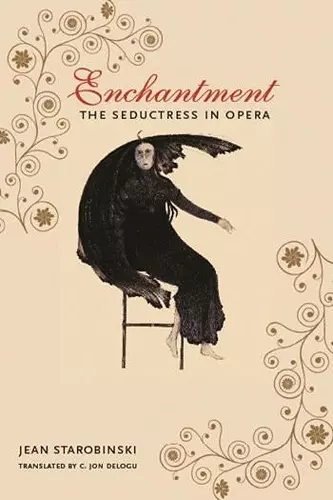Enchantment
The Seductress in Opera
Jean Starobinski author C Jon Delogu translator
Format:Hardback
Publisher:Columbia University Press
Published:9th May '08
Currently unavailable, and unfortunately no date known when it will be back

The originality and inestimable contribution of this book lie in the finesse, range of cultural reference, and profundity of thought that Jean Starobinski brings to his analyses of the structural translation of words into song (libretti into music) in a rich body of operatic works. Starobinski writes from a great depth of cultural knowledge, without a drop of jargon, in clear, poetically resonant prose that brings highly complex subjects alive both intellectually and aesthetically. -- Suzanne C. Nash, professor of romance languages and literatures, Princeton University Jean Starobinski is one of the most prominent literary scholars in the Francophone world, a status which he owes in no small part to his splendid writing skills. This richly literary and interdisciplinary approach to opera makes his work quite unique and very enjoyable to read. -- Dan Edelstein, assistant professor of French, Stanford University
What is it about the marriage of music and the stage that fills us with such bewilderment and passion? What is opera's seductive promise and how does it draw us into its embrace? This study considers the allure of several seducers and seductresses from nineteenth-century opera - Monteverdi's "Poppea", Handel's "Alcina", and Massenet's "Manon".We often look to the theater for spectacle and wonder, but in opera, we find pure enchantment. What is it about the marriage of music and the stage that fills us with such bewilderment and passion? How does the sensual space of opera transport us into the realm of dream? Jean Starobinski considers the allure of several seducers and seductresses from nineteenth-century opera-Monteverdi's Poppea, Handel's Alcina, and Massenet's Manon, among others-and how their stories are woven into the fabric of Western culture. A talented storyteller and renowned critic of literature and music, Starobinski moves from musical analysis and textual exegesis to an investigation of the political, social, and aesthetic scene of Europe at the time. He traces the elements of theater, poetry, painting, sculpture, dance, and music as they occur in operatic performance, and shows how opera's use of narrative genres, especially the fairy tale, in turn influenced many important short stories, novels, and other works. Nineteenth-century romantics were drawn to opera because of their desire to revive a religious vision of the world that the Enlightenment suppressed. Starobinski revisits the experiences of Rousseau, Stendhal, Hoffmann, Balzac, and Nietzsche, major writers who fell for opera's portrayal of "heaven," the loss of one's love, and the task of the artist, whether composer or performer. Starobinski's critical breadth and depth, as well as his eclectic taste and keen observation, echo such great comparative critics as Erich Auerbach, Rene Wellek, George Steiner, Harold Bloom, and Angus Fletcher. This spellbinding book will enchant not only fans of the opera, but also those who wish to understand the form's enduring heritage in Western culture.
[A] thought-provoking philosophical study... Recommended. Library Journal
ISBN: 9780231140904
Dimensions: unknown
Weight: unknown
288 pages